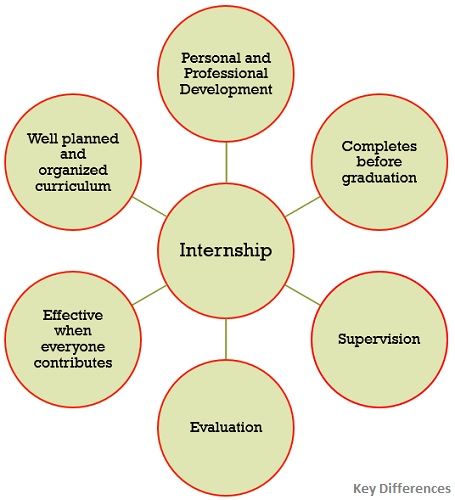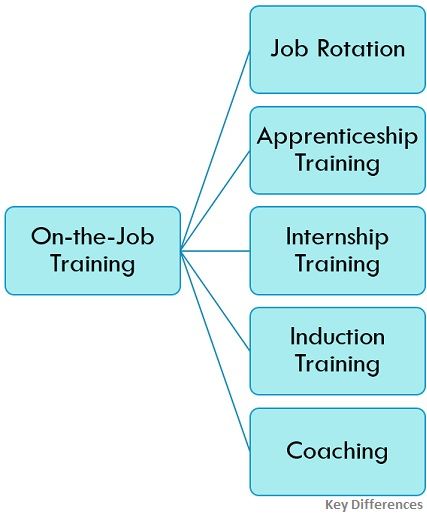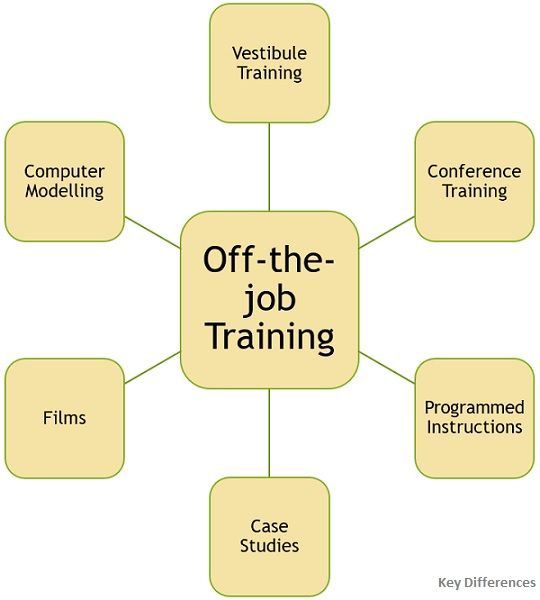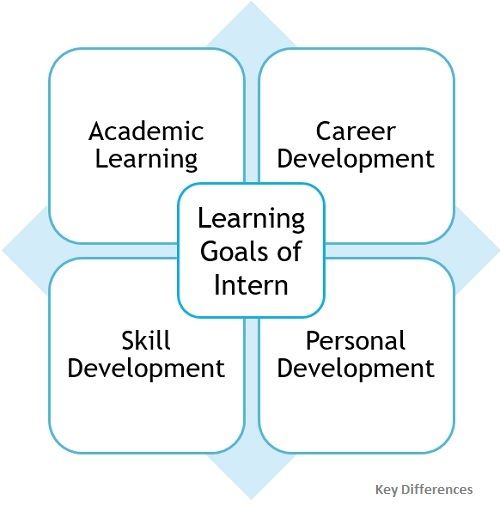 Many a time, students juxtapose training for an internship, but there is a huge difference between the two, which they need to understand because it helps in creating their portfolio. Also, with this, the students can decide, which career path or domain is best for them. While training is a learning process in which attempts are made to increase the knowledge, skills and competencies of the trainee so that he/she can easily perform a specific job.
Many a time, students juxtapose training for an internship, but there is a huge difference between the two, which they need to understand because it helps in creating their portfolio. Also, with this, the students can decide, which career path or domain is best for them. While training is a learning process in which attempts are made to increase the knowledge, skills and competencies of the trainee so that he/she can easily perform a specific job.
On the other side of the coin, we have Internship. Basically, an internship is a joint programme designed by universities, in which the institute, and companies, cooperate to impart knowledge to the students so that they can understand the practical application of the subjects, which they have studied during their undergraduate or postgraduate courses.
In this post we will enlighten you with all the important points that differentiate training from an internship, so you can easily identify whether you are a trainee or an intern.
Content: Training Vs Internship
- Comparison Chart
- Definition
- Key Differences
- Training Methods
- Emerging Trends in Internship
- Conclusion
Comparison Chart
| Basis for Comparison | Training | Internship |
|---|---|---|
| Meaning | Training is a process of teaching job-specific skills and behavior to employees. | The internship is a short-term job training, which is a combination of job training and classroom instruction. |
| For whom | Employees and Prospective Employees | Students |
| Period | Varies from company to company, as per the requirement, but generally, the training period ranges from 2 weeks to 6 months. | May range from 2 months to 12 months. |
| Objective | Improving employees performance and productivity. | Gaining practical knowledge. |
| Remuneration | Training is always paid. | The internship may or may not be paid. |
| Skills | The trainee may or may not possess the set of skills which are required for the performance of the job. | Interns generally possess some skills in the concerned domain and look for polishing them. |
| Provided | On-the-job or off-the-job | Always on-the-job |
| Company's rules and regulations | Trainees have to follow the rules and regulation of the company. | It does not apply to interns. |
Definition of Training
Once the employees are selected by the organization to fill the vacancies for different positions, providing them training for particular tasks, which is delegated to them is extremely important. Training is the process of sharpening the knowledge and skills of the employees, so as to prepare them for the job.
It results in learning, i.e. the trainee learns new habits, practical knowledge, refined skills, at the time of training, which results in improvement of performance. So, we can say that:
- It is a program organised by most of the companies that fill the gap between job requirements and employee skills, knowledge and behaviour.
- Job-specific, as it focuses on the present job and addresses the performance deficits and issues.
- It is provided to the people who need to be brought up to a particular performance level.
The training programme is designed to impart skills in existing and newly hired employees, so as to increase their performance and productivity level. In many corporates, employees get permanent only when the new joiners successfully complete their training, while the existing employees are promoted, for good performance.
Further, In-plant training is one that takes place in the industry or company, where you will get to learn something which happens in the real world. Further, a training undertaken by the company itself or an institute owned by the company is called industrial training.
Also Read: Difference Between Training and Development
Definition of Internship
The internship is a method of experiential learning, that combines the theoretical knowledge learned in the classroom with practical application and skill development in the organizational setting.
It involves critical monitoring of work or service experience, in which the intern has purposeful learning objectives. Further, it clearly showcases what the intern has learnt throughout the experience, as well as it leads to the all-round development of the learner, be it academic, professional, personal and social.
- Duration: 3 months to 1 year
- Commitment: Part-time or full time
- Remuneration: Paid or Unpaid
In other words, an internship is a short term training, wherein the intern learns and develops skills in a particular domain or career.
Characteristics of Internship
The internship is an arrangement that incorporates work-related experience in the education programme, that facilitates students to take an active part in planned, organized and supervised work. It is characterized by:
- Facilitates the personal and professional development of the intern by way of challenging work assignments or projects.
- It is completed before the student pass out from the degree college.
- The curriculum is designed and planned after consultation with the concerned education department, so as to fit in the course.
- Encompasses the element of supervision which provides mentoring and guidance.
- The evaluation process is conducted at the end of the internship.
- It is effective when the intern, college and business enterprise all share the responsibility of making the internship a valuable experience.
Learning Goals of Interns
- Academic Learning: Practically applying or using the knowledge learned in the college or university over the years, to the employment setting.
- Career Development: Developing knowledge of the requirements and duties of a specific rank or position and delving into it.
- Skill Development: Learning, developing and polishing the skills which are required in the organization.
- Personal Development: Learning rational decision making, reasoning, critical thinking, forecasting skills, etc.
Also Read: Difference Between Internship and Externship
Key Differences Between Training and Internship
Let us discuss the differences between training and internship in an elaborated manner:
- Training is a programme organized by the companies for their employees – existing or freshers, to improve their skills and performance, so as to get the desired efficiency and effectiveness in work. As against, an internship is a supervised learning method wherein students apply their theoretical knowledge and develop new skills in the workplace setting.
- Training is provided to existing and recently joined employees of the concern. On the other hand, students of undergraduate or graduate course undergo internship training.
- Duration of the training varies from one company to another, depending upon the requirement, but generally, the training period ranges from 2 weeks to 6 months. As against, duration of internship may range from 2 months to 12 months.
- The objective of the training is to improve the employee’s performance and productivity. Conversely, an internship is designed to impart practical knowledge to the students.
- When it comes to remuneration, training is always paid whereas internship may or may not be paid.
- In the case of training, the trainee may or may not possess the set of skills which are required for the performance of the job. In contrast, the interns generally possess some skills in the concerned domain and look for polishing them.
- The training can either be on the job or off the job, whereas an internship is always on the job.
- Rules and Regulations of the company are applied to the trainees but not to the interns.
Training Methods
Training methods are divided into two categories: On-the-Job Training and Off-the-Job Training which are discussed as under:
On-the-Job Training
On-the-job training takes the following forms:
| Job Rotation | In job rotation, the employee is rotated from one job to another within the same organization, in an orderly manner. Further, job rotation may be vertical or horizontal. While in a vertical job rotation the employee is rotated from a lower rank to higher rank jobs, in a horizontal job rotation, the employee is rotated on same level jobs. |
| Apprenticeship Training | Those who wish to enter skilled jobs, are provided apprenticeship training under a trainer who guides and supervises the worker about the skills. Once the worker learns those skills, then the worker takes up the job, while the trainer becomes the supervisor. |
| Internship Training | A training programme designed by the universities in which the students are provided practical training, in the companies, so that they can learn the skills and work culture. |
| Induction Training | In an induction training the new hires are acquainted with the organization and the job, superior and subordinates, so as to make them familiar with the work environment and culture. |
| Coaching | In this training method, the superior guides the subordinates about the various methods or skills to perform the job. |
Off-the-Job Training
Off-the-job training takes the following forms:
| Vestibule Training | This method is mainly designed for the technical staff who regularly deal with the tools, equipment, plant and machinery. The staff is provided job education training at the workplace, by establishing a simulated set up, which similar to the main production plant. |
| Conference Training | Conferences are organized by the firms or by the industry, wherein every participant is aware of the topic of discussion beforehand. Further, papers are read and then discussed to arrive at a consensus. It attempts to expand the outlook of the participants. |
| Programmed Instructions | It tends to integrate a pre-planned and proposed acquisition of certain skills and basic knowledge. Hence there is no involvement of a trainer, as the information is provided by way of books or through a teaching machine. |
| Case Studies | The employees are given case studies, for discussion and they are expected to take an active part in the discussion. The discussion is performed in an open communication environment and all the aspects of the issue are taken into consideration. The discussion ends with reaching a conclusion that resolves all the issues correctly. |
| Films | Movies, documentaries and short films are used to demonstrate the skills which cannot be shown by any other method. |
| Computer Modelling | Computer Modelling as the name suggests is a computerized simulation technique in which training is provided for a high risk or high-cost involved situations. |
Emerging Trends in Internship
Primarily, internships are classified into the paid and unpaid internship, credit and non-credit internship. Since last few years rotational internship and virtual internship are in vogue, so let’s discuss it:
Rotational Internship
Internship programmes wherein the intern rotates between the jobs in different departments, i.e. the intern turn by turn work in different jobs in the host organization. It became trending because interns learn more roles and responsibilities. In this way, they can use their skills and interests in different positions.
Virtual Internship
It is a new alternative in which the intern works remotely, be it from the home, library, cafe, or school, rather than working in the host organization’s company office. Hence, students from different states and countries can get an internship in the organization.
Also Read: Difference Between Apprenticeship and Internship
Conclusion
The internship is an arrangement between the college or institute and the organisation to provide practical knowledge to the students about the real world and workplace.
On the other hand, training is a process through which an organization attempts to develop and polish the skills of the employees so that their performance can be improved.







sushmi says
This article provide a clear clarification about the training and internship.
Internship Program Application says
Your article has given me a lot of new ideas! This is a fantastic article. Thank you for sharing your knowledge!
anil narula says
Thanks for sharing. I will try to implement these methods on my blog. Thanks for sharing. Keep updating us.
uma choudhary says
All the information given here is so useful and important for all. Nice, keep on posting like that. Thanks
Priyansh says
Thank you so much for sharing such an informative post; it’s really nice..!!
Aasha thakur says
It is very important for students, Thanks